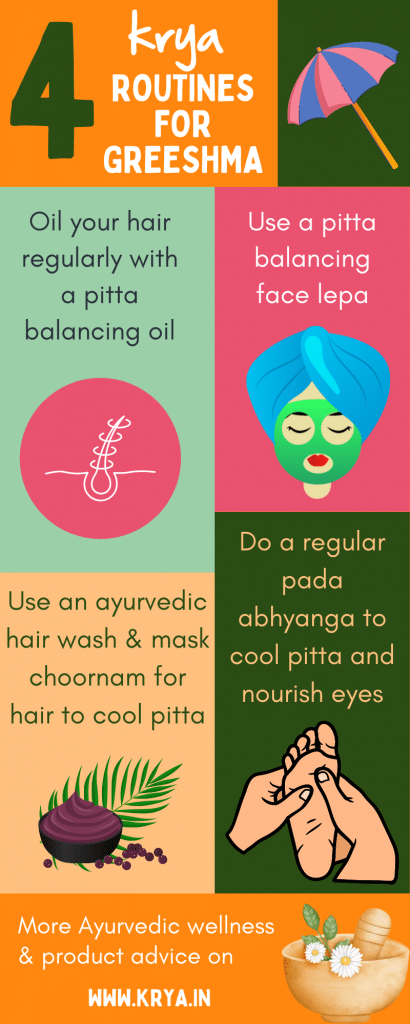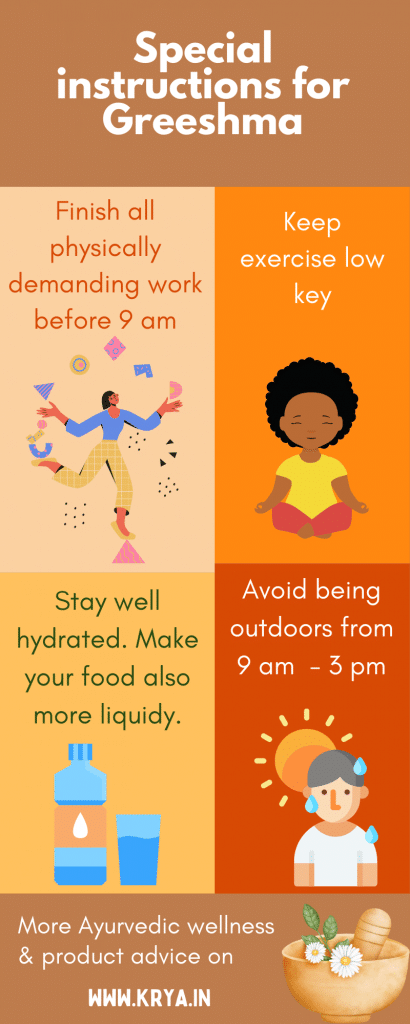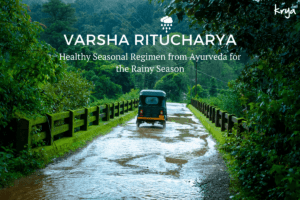This post was last updated on August 5, 2023 by Preethi Sukumaran
According to Ayurveda, greeshma rtu is a two month season of peak summer. It lasts from mid-May to mid-July. Greeshma rtu is the last of the 3 seasons in the adana kaala or Northern solstice, when the Sun moves in the northern direction (same as Uttarayana).
Adana kala and its impact on our body
Adana kaala starts from makara sankaranti, which falls in mid-january, and lasts till the end of greeshma rtu. This is considered to be a period of ‘reduction’ or ‘extraction by squeezing out energy’ for humans and all sentient beings on this planet. During this period, the Earth’s atmosphere becomes more dry and hot due to the northern movement of the Sun.
As adana kaala proceeds from late winter till summer, and the intensity of the Sun rises, we experience two things;
- We feel increasingly tired and listless .

- When the Sun becomes more piercing, the kapha dosha in our body depletes. The overall ojas (vitality) in our body also depletes because ojas is linked to a healthy kapha dhatu. That’s why we often speak of feeling “wrung out” or “squeezed out like a fruit” in this season. And, the Ayurvedic texts confirm this effect as well.
- The fresh produce and water bodies become tikta (bitter), kashaya (astringent) and katu (pungent/ sharp)
- In the uttarayana path of the Sun (from winter to summer), there is a strong increase in teekshna (piercing and intense), ushna (hot) and rooksha (drying) properties of the Sun, which also reflects in the Earth’s atmosphere. Hence, the fresh produce and water bodies get affected by the piercing intensity of the Sun, and carry these tastes.
Properties of greeshma rtu / summer season
During greeshma rtu we experience many symptoms associated with heat, dryness and intensity.
- We feel wrung out or squeezed out. The Ayurvedic term for this is ‘sankshipta’
- The kapha in our body gradually weakens and vata aggravates because of the combined effect of the Sun and wind
- The weakening and aggravation of the two doshas in the body impair the basic digestive process.

On one hand, there is not enough kleda (moisture) in the body to sufficiently coat the food and slowly ‘cook it’ with our digestive agni. When the food is not properly digested, the body won’t be able to extract nutrients fully.
On the other hand, for those with pitta dominant prakriti, the increase in heat fans the agni to teekshna (intense) levels. This is similar to what happens to our food when we cook it in high heat and without enough moisture. The food gets burnt and becomes unpalatable.
In effect, when our digestion becomes impaired, our body absorbs little nutrients from the food we eat. Our body becomes weak. And we find it difficult to handle heavy or hard-to-digest foods. The body’s inability to extract nutrients efficiently also hampers our strength. And all our dhatus become weak.
These effects show us that greeshma rtu is the season when our bodies become the most weak.
Food rules or ahara niyamas for greeshma rtu (Summer)

Foods you can eat in greeshma rtu (Summer)
- Eat polished or semi-polished rice (with bran removed), or white rice (Ayurvedic texts mention rice that looks like the moon or jasmine). White-coloured rice is easier to digest, has good madhura rasa, does not put a strain on digestion, and doesn’t aggravate pitta.
- Make your daily dishes like dal and sambar more watery than usual. Use less tamarind in daily cooking. Try souring agents like amla or lemon (which have madhura vipaka). You can also experiment with non-sour versions of these dishes.
- If you regularly eat meat, have the rasa (watery soup) of lean animals.
- Include melted A2 desi cow ghee in all three meals.
- Drink boiled and cooled water stored in an earthen pot. You can flavour the water with specific herbs like patranga and vetiver. Unboiled water is guru (heavy), and hard to digest
- Have well churned lassi or buttermilk (sweet or spiced). Have drinks like panaka. For example, it is good to have fresh fruit juices made from sweet fruits, and prepared with lemon and sugar. Coconut water is beneficial in summer as it is sweet & brahmanya. But remember to have it in the evening, like a snack, because it is also guru (heavy) in nature. Sugarcane juice is also a panacea in this season. It helps ease excess heat, burning sensations, burning urination, prickly heat, weakness and more.

- Include seasonal fruits in your diet. However, be careful to choose organic fruits grown without chemical contamination . Eat well-ripened, natural mangoes which have been plucked slightly raw and ripened at home naturally. You can also blend such mangoes with milk and drink. Well-ripened mangoes increase both pitta and kapha and reduce vata. Remember that in summer, an increase of kapha + reduction of vata is welcome, but not an increase in pitta. To avoid the ill effects of pitta aggravation, don’t overeat mangoes. If you are prone to heat boils or sores after eating mangoes, soak the mangoes for an hour in clean water before eating them. This reduces the pitta property of the mango. Chemically ripened mangoes and pesticide sprayed Mangoes are tasteless, high in heat and very bad for the body – PLEASE AVOID chemically grown or ripened mangoes.
Foods you should avoid in greeshma rtu (Summer)
- Avoid brown rice, red rice, black rice and millets
- Avoid ice creams. They do you NO GOOD. Stick to freshly squeezed fruit juices with some good quality, organic, sulphur-free sugar
- Avoid drinking iced, frozen and cold foods as well. They freeze pitta and cause blocks in the body. If you’re having foods like buttermilk, sugarcane juice and coconut water, don’t add ice or cold water to them. These liquids by themselves are cooling in nature
- Avoid CURD throughout the summer. Curd strongly aggravates pitta. It causes serious hives, prickly heat, itching/ burning sensation on skin, and excessive menstrual bleeding. Buttermilk, as mentioned above, is a better choice

Strongly avoid alcohol in Summer
Avoid alcohol in summer because it is teekshna (piercing) and drying, which is already the nature of this season. If Alcohol is unavoidable, dilute it well before consuming. Otherwise, it can lead to dizziness, inflammation and fainting due to pitta aggravation.
Other general guidelines for greeshma rtu (Summer)
- Bathe in slightly cool (not cold water) water as suggested in the Ayurvedic texts
- Especially in greeshma rtu, bathe with a snana choorna (herbal bath powder) instead of with soap. There is a high chance of pores getting clogged due to excessive sweating. When we use soaps, it further clogs the pores and leads to more skin problems resulting from clogged pores

- Avoid using sweat-suppressing products like antiperspirant deodorants. Such products also clog the pores and impair the skin’s thermo-regulatory function. Instead, take steps to ensure your skin is clean, pores are properly opened, and are functioning well for proper thermo-regulation
- Wear white or pastel-coloured clothing. They help cool the body, and feel fresh and pleasant
- Try to have food in a banana leaf or a silver plate. Both are kapha enhancing and are good for the body

- Reduce sexual activity this season. Unless you are trying to conceive, Ayurveda suggests that you restrict sexual activities to 3-4 times a month in summer. This is because sex depletes kapha, which is already quite depleted in this season. Some compensatory measures you can take after sexual activity are drinking milk. Milk makes up for the loss of ojas & dhatu from sexual activity
- If you feel over-depleted in summer, apply nabhi ghee at night. Take a drop or two of cow ghee and apply it in the navel/ belly button region. This helps balance both pitta & vata aggravation

4 Krya routines that can help with keeping the body cool in Greeshma Ritu
- Oil your hair frequently and wash hair twice a week. Apart from ensuring healthy hair growth, regular hair oiling balances vata and pitta in the scalp and body, improves eyesight, reduces anxiety and stress, improves bone strength and promotes cheerfulness
- Use pitta-balancing hair lepas (masks) and hair wash choornams (powders) to wash your hair. The predominantly aromatic & pitta-balancing herbs like vetiver, chandana (sandalwood), rakta chandana, ku-chandana (patranga) and nannari are great herbs for summer
- Use Krya’s face lepas (masks) also liberally this season. It helps cool down pitta in the body
- Do pada abhyanga with a small amount of ghee added to the abhyanga oil, especially if there is a burning sensation in the body. If you have a dominant pitta prakriti, we recommend you use the Krya Classic Abhyanga Oil or Krya Traditional Baby Massage Oil. You can also try a 50:50 combination of both oils for abhyanga and pada abhyanga in summer. Here is a Krya video guide on how to do a pada abhyanga

Special instructions for greeshma rtu (Summer)
- Finish cooking earlier in the day to avoid aggravating pitta in your food
- Avoid daytime exercise. Many people try to squeeze in a workout just before lunch or do their workout well after 9 AM when the Sun is already hot
- Avoid vigorous exercises too in this season. This is especially not the season for absolute beginners to start new exercise regimens like running or weights
- Keep yourself sensibly hydrated with fluids. Include liquid preparations in your meals as well
- Avoid the heat of the Sun by staying indoors in the daytime as much as possible
- Avoid doing a late abhyanga snana. In summer, you should do abhyanga MILDLY, and preferably before 8 AM. If you’re not used to a full abhyanga massage, do a mini-abhyanga during the week. And, do the full abhyanga once a week. The suggested practice for full abhyanga this season is, Fridays for women & Saturdays for men. Abhyanga controls vata, which is likely to aggravate without our knowledge in summer. Remember to also avoid over-straining yourself by doing a vigorous abhyanga, which can deplete kapha

- Take a short afternoon nap if absolutely required. This is a recommended practice only in summer, because this season increases kleda (moisture) due to increase in kapha. That being said, afternoon nap also increases kapha AND pitta in the body. To avoid aggravating pitta and over aggravating kapha, follow these precautions if you intend to take a nap;
- Wake up earlier than usual in the morning. This way, the body is sufficiently tired out to require an afternoon nap
- Do NOT sleep with AC on. In fact, it is always better to avoid air-conditioning
- Sleep on a non comfortable surface. For example, sleep on the floor with a pai / dhurrie
- Time your nap and sleep only for a short duration. This duration varies in each person’s case. For example, in my case, any nap above 10 minutes makes me foggy
- After the nap, wash your face and rinse your mouth
Note: These nap precautions do not apply for small babies, patients, older people, and people who are very lean / emaciated. Read our blog to find out more about who is eligible for an afternoon nap.
Unique, ancient & effective recommendations from Ayurveda
- Have water-based cooling devices in the bedroom. For example, the texts suggest hanging curtains which have been soaked in water and squeezed well. This screens the heat and blows cool air into the room. This helps you avoid ACs as well, which are bad for health in all seasons

- Spend the evening and night time in the terrace, especially when the night sky is bathed in moonlight
- Relax your mind and withdrawn from sexual activities, strain or stress
- Wear garments made of ultra thin or finely woven cotton cloth
- Wear fragrant flowers like jasmine in your hair or as a garland
- Wear necklaces made of natural pearls or sandalwood beads
- Prattle small babies and toddlers. This is very soothing and pitta balancing. The texts encourage us to spend time with such innocent children
- Apply fragrant and cooling unguents like sandalwood paste on your person
- Spend summer days near rivers, lakes and forests with cool, fragrant trees around
Common greeshma rtu (Summer) health problems & solutions
Stomach Ache/ Diarrhoea
- Eat watery and non-spicy/ sour/ salty food to prevent this
- Avoid all street food and chaat. Immunity is low in this season and such foods can trigger infections
- Ensure you have 30 to 40% liquids in your daily diet
- Drink boiled and cooled water with summer herbs like we’ve suggested above
- Do not sleep till late in the morning
- Eat your meal in the right order – from sweet & heavy to light. And, end your meal with watery, well churned buttermilk (which also helps supplement gut flora)

Prickly Heat/ Rash
- Spray rose water frequently on the affected skin areas
- Use the Krya Baby prickly heat lepa on the easy areas. Apply after mixing in rose water. Leave on for 5-10 minutes like a thick apck and rinse out before it dres. It cools, soothes the area and reduces itchiness and inflammation.

- In very high cases of prickly heat, use the Krya Kashaya snana churna for sensitive skin.
- Avoid using creams/ lotions/ moisturisers and any such pore clogging products
- Use the appropriate Krya Body Wash as a lepa (mask) by mixing it in clean water and applying it on the rashy areas. Don’t allow this mask paste to fully dry out on your skin. Instead, rinse it off during bath. Avoid rubbing/ scratching the affected areas
- Reduce heavy-to-digest foods and increase fluid intake in your diet. Include fresh fruit juices and sugarcane juice. Reduce consumption of mangoes till the rashes completely heal
Krya products ideally suited for greeshma rtu (Summer)
- All Krya Hair Oils except Intense Hair Oil
- All Krya Hair Masks except Intense Hair Mask
- All Krya Face Lepas (face masks)
- All Krya Body Washes except Sensitive Body Wash (exempted for those with sensitive skin using it for special needs)
- Special pitta-balancing hair oil and body wash ranges like Classic and Classic Plus, After Sun Range and Men’s Range
Seasonal Guidelines for other Ritus
If you enjoyed reading this, here are the Ritucharya guidelines for other seasons:
- Hemanta Ritucharya (Early Winter seasonal living guidelines)
- Vasanta Ritucharya (Spring Seasonal living guidelines)
- Varsha Ritucharya (Monsoon seasonal living guidelines)
- Sharad Ritucharya (Autumn seasonal Living Guidelines)
To sum up: Greeshma Ritucharya
Ayurveda is a unique holistic science which suggests following a preventive wellness regimen . The uniqueness of Ayurveda is the way it understands the interplay of the pancha mahaboothas, the movement of the sun and the interplay of seasons on our health and well being.
When these powerful concepts are adopted and followed, we find there is a great reduction in illness and an improvement in overall health, wellness and mental outlook.
The understanding of the acharyas is so nuanced , that they are able to give us wide ranging suggestions to live in harmony with the seasons right from what we should eat, to the fabrics we should wear, to even special practices we should follow in each season.
We hope you found this compilation of the Ritucharya guidelines for Greeshma Ritu interesting. We also hope you will implement as much as you can of these guidelines for your health and well-being. If you have any questions on this, please do write to us.





Thank you for putting together this information so clearly. I have a pitta dominant constitution and following the right seasonal regimen and diet have been hugely beneficial for me. I always look forward to your blogs!
that is great to know, thanks for sharing. We had also put up a 35-point program to help balance pitta-dosha in our facebook group. we will be updating the information on our blog soon.
Very educational
Nicely explained
Very well explained,
I have experienced at the beginning of August soon after Greeshma Ritu when there is rain, lethargy and excessive sweating in the face and body. I have stiffness in my muscles and feel very hungry .
Can you suggest some measures please?